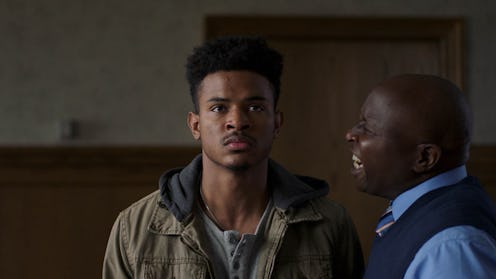
Last year, the film Goat shed light on an issue at American campuses that had long been swept under the rug: The sometimes extreme horrors of fraternity hazing. Goat was based on the actual experiences of Brad Land, as documented in his 2004 memoir of the same name. Now, a new Netflix movie called Burning Sands looks to further explore the epidemic of fraternity hazing; this time at an all-Black fraternity. But is Burning Sands a true story like Goat?
It's not. Unlike last year's big frat hazing drama, this year's entry to the quickly-growing genre is a complete work of fiction. The movie takes place at Frederick Douglass University, which is not a real college. I mean, how could it be? Colleges generally don't get named after people who are possibly still alive and who are getting noticed more and more, I've noticed. But like its predecessor, Burning Sands also focuses on the extreme violence that goes on during some hazing rituals, and the internal struggle that pledges feel when it comes to balancing their desire to belong versus the call to end the abuse. The film is directed by Gerard McMurray in his feature-length debut, off a script he co-wrote with Christine Berg.
But even though the movie isn't based on a true story, it does come from a very real place. McMurray himself is a fraternity brother at Omega Psi Phi; one of the "Divine Nine" Black fraternities and sororities located at Historically Black Colleges and Universities that belongs to the National Pan-Hellenic Council. And even though he knew that showing the underbelly of what sometimes goes on at these fraternities — even though pledging has been outlawed at them for decades — would prove controversial, he's hoping the film can start a dialogue that will force the Divine Nine to change for the better.
"If we can have a conversation about brotherhood, friendship, what it’s like to go to a HBCU, and hazing — it’ll be a good conversation to have," the director told Ebony's Britni Danielle. "I come from this world of going to a HBCU and being in a Black fraternity and I just wanted to explore that subculture. I thought it would be a great film for audiences to see. A lot of people don’t know about HBCUs, Black fraternities, and what it’s like to go to a Black college, so I thought it was important to dial into that subject matter and explore themes of our history in this country, [and] what it’s like to be a Black man in America."
Although Burning Sands isn't actually a true story, it was written by a man who experienced its subject matter firsthand. And while some will no doubt question the legitimacy of the extreme violence seen in the film, it should still serve its purpose in helping to expose the very real problem of fraternity hazing.